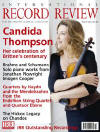Texte paru dans: / Appeared in:
*

International Record Review - (03/2013)
Pour
s'abonner / Subscription information
Naïve
OP30536

Handelians may be spoilt for choice of recordings of Handel’s still most frequently staged and popular Italian opera, but no earlier versions are without stylistic flaws and questionable editorial choices . Alan Curtis’s new version has fewer than most: he sticks closely to the 1724 text with the principals’ arias — including all three of Achilia’s and four of Tolomeo’s — given complete, and his cast is as evenly balanced as any on disc. His pacing of the recitative and tempos for concerted numbers seem sensibly judged — he refuses to luxuriate languidly in slow numbers such as Cleopatra’s great G minor solo ‘Se pietà’ and the famous ‘Piangerò’ and, apart from encouraging vocal decorations for the repeat sections of da capo arias, his reading of the music is free of interpretative ideas, even eccentricities, which have become something of a norm in performances of this work outside the UK.
I can imagine some Handelians preferring Curtis to the more interventionist René Jacobs (Harmonia Mundi), Marc Minkowski (Archiv) and George Petrou (Dabringhaus und Grimm), although fans of those front-ranking European Handelians might find him strait laced, even a bit staid. Like many Baroque specialists, he doesn’t convey the theatricality of the dialogue recitative which carries — or rather should carry — the drama forward, but too often these days, the crucial links from one aria or duet are sung full out rather than in the parlando style that Baroque theatre composers surely intended.
Curtis’s cast — which introduces some new Handelian names to me — comprises excellent singers, without a weak link, although I can imagine some Cesare buffs at least questioning the style of Marie-Nicole Lemieux in the title role. Although her voice is more feminine-sounding, her plush contralto-ish timbre and ballsy manner recalls that of Marilyn Horne in other Handel castrato parts (Orlando, Rinaldo) . In bravura arias such as ‘Al lampo dell’armi’ (‘At the flash of arms’), her coloratura is excitingly delivered --- though in more breaths, I suspect, than Handel would have expected of his star leading man, Senesino — but she resorts to fruity chest tones in the alto register which Handel demanded to exploit the famed glory of his castrato’s low notes, which sounds not dissimilar to countertenors falling into their natural baritone range in the same tessitura. The effect strikes me as comical, and Lemieux seems to play up the idea of Cesare as a rangy, butch woman in drag. Certainly Handel occasionally seeks to deflate the monstrous egos of his pampered stars, but comedy in Giulio Cesare is incidental and shouldn’t undermine the seriousness of his protagonist.
Karina Gauvin manages the transition from flirty sex-kitten’ — Winton Dean’s unavoidable description — to lamenting lover more successfully, her gleaming bright soprano tripping winsomely through Cleopatra’s teasing seductions to sublimely moving outpourings of grief. Occasionally she overdarkens her tone in ‘Se pietà’ and ‘Piangerò’ and her voice sounds uncharacteristically plummy. I have no reservations whatsoever about Romina Basso’s Cornelia, as beautifully sung as Bernarda Fink’s for Jacobs, but she has the added advantage of a native Italian speaker. This is surely state-of-the-art Handel singing and I half-wondered if the set might have profited from Basso and Lemieux switching roles.
Almost as fine is Emöke Baráth’s Sesto, a light, keen-edged soprano, rather than the usually cast mezzo, who sounds appropriately boyish in this pugilistic Cherubino of a part. Her ‘Cara speme’ (‘Dear Hope’) — one of Handel’s most disarmingly simple and touching introspections — is one of the loveliest pieces of singing on these discs. At the opposite end of the vocal spectrum, Johannes Weisser ‘ s forthright singing of Tolomeo’s bluff henchman, Achilla, is another signal success his gruff bass notes come as something of a surprise after his suave, lyric-baritone Don Giovanni for Jacobs.
I’m less taken with Filippo Mineccia’s Tolomeo, although his nasal, slightly hooty countertenor is a reasonable fit for the petulant wannabe boy pharaoh. The two comprimario parts are well taken by Gianluca Buratto (Curio) and Milena Storti (Nireno), although casting a female contralto as Cleopatra’s eunuch seems odd in the context of the I724 score (in the following year’s revival, Handel renamed the character Nirena for a female alto and wrote an aria for her, omitted here).
In sum, this Giulio Cesare is a welcome addition to this
wonderful opera’s now substantial discography, but, for me, it doesn’t
displace Jacobs’s set with Jennifer Larmore’s superior Cesare, even if
Gauvin is a more glamorous-voiced Cleopatra than Barbara Schlick.
Fermer la fenêtre/Close window
Cliquez l'un ou l'autre
bouton pour découvrir bien d'autres critiques de CD
Click either button for many other reviews


